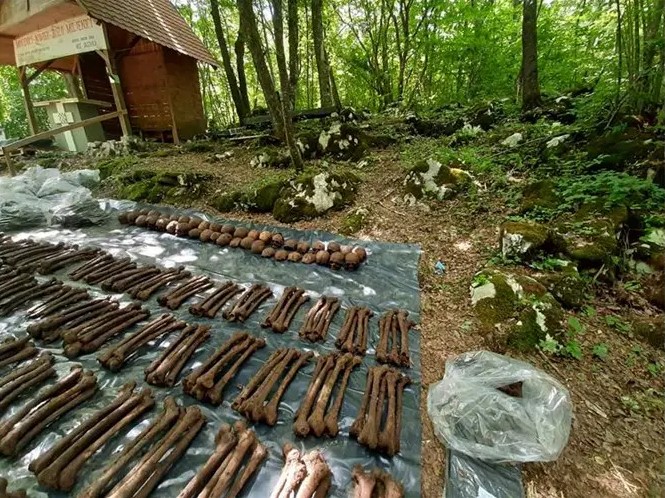WHY CROATIA HONOUR EXECUTIONERS?

By: Álvaro Peñas
Photo: Jazovka.hr
On 15 May 1945, a week after the end of World War II, communist partisans took numerous wounded Croatian soldiers from Zagreb’s hospitals and brought them to the psychiatric hospital in Vrapče on the outskirts of the capital, an institution run by the Sisters of Charity. Once there, all the prisoners were strangled or butchered in the basement of the hospital. After killing them, the partisans loaded the corpses into trucks and transported them to Jazovka and other mass graves. Three nuns, Sisters Geralda Jakob, Konstantina Mesar and Lipharda Horvat, witnessed the massacre. Unfortunately, the communists saw the sisters and decided to murder them so that there would be no witnesses to the crime. The three nuns, along with many others, were thrown into the Jazovka pit.
Jazovka, like so many other places where the partisans executed their crimes, was erased from history until the fall of the communist regime. In 1989, the grave was rediscovered by a speleologist, Mladen Kuka, but the exhumation of the victims’ remains would not take place until July 2020, when the Croatian Veterans Ministry began work and determined that there were at least 814 skeletons at a depth of about 40 metres. The first victims were Croatian soldiers captured in January 1943 and executed by the partisans. In 1945, the partisans used the pit for victims from Zagreb hospitals: wounded prisoners, civilians, doctors, nurses, and Catholic nuns. Most were dead when they were thrown into the pit, but others were thrown in alive to die in terrible agony.
To ensure that these events are not forgotten again and to honour the victims, a pilgrimage to Jazovka takes place every 22nd of June. In addition, the process of the beatification of the three sisters killed in Jazovka and four others who were also victims of martyrdom began last year. However, June 22nd is also a state holiday in Croatia (‘Anti-Fascist Struggle Day’—in Croatian: Dan antifašističke borbe) in remembrance of the partisans, i.e. the group to whom those who murdered thousands of people in Jazovka and in many other places belonged. On 22 June 1941, at the time of the German invasion of the Soviet Union, the first Croatian anti-fascist partisan unit was supposedly formed around a group of communists from Sisak who took up arms to ‘fight fascism.’ While it is true that the communists in the various German-occupied countries did not take up arms until Hitler attacked Stalin, because their allegiance was to the communist party of the USSR and not to their respective homelands, the story of the Sisak anti-fascists is an invention of Croatian national-communist historiography in the 1960s—an invention that succeeded and became a state holiday after the establishment of independent Croatia in the 1990s. In the Yugoslav communist period, the official start of the anti-fascist partisan struggle was celebrated on 29 June, the date on which the Yugoslav Communist Party began the uprising in Serbia in 1941.
In 2009, President Stjepan Mesić commented that talking about the crimes of communism was an oxymoron. For him there were no crimes of communism; this is a sign of how these elites continue to deny communist crimes.
It is surprising that two such opposite commemorations are held in Croatia on June 22nd: one in Sisak, in honour of the communist partisans, and one in Sošice, which is the closest town to the Jazovka grave, for its victims. This is a consequence of the lack of decommunisation in Croatia after the collapse of Yugoslavia and the survival of communist elites—elites that have legitimised themselves by manipulating the past. As Croatian MP Stephen Bartulica points out in this interview, these elites have consolidated their power in all fields:
This year, there has been another unpleasant consequence of this denial of history. The Sisters of Charity wanted to put up a memorial plaque in memory of Sister Lipharda Horvat at her birthplace in Varaždin, but Mayor Neven Bosilj of the SDP (Croatian Social Democratic Party) would not allow the plaque to be installed. The reason given by the mayor is his disagreement with the following phrase: “By order of the communist regime [she] was thrown into Jazovka.” According to the social-democratic city council, in order to get the permit, references to the communist regime need to be removed and only mention that “she was thrown into Jazovka.” Mentioning communist crimes is offensive to some.
Marko Milanović Litre, a Croatian Sovereigntist MP who took part in the pilgrimage to Jazovka, was outraged by the decision of the SDP in Varaždin to ban the memorial plaque at the house of Sister Liphardu Horvat: “Some have questioned the importance of remembering our painful history. To those who believe that the youth should not be burdened with the past, let me say: a nation without memory is like a ship without a rudder and compass.”
Lack of memory, or worse, selective memory, is increasingly common in Europe. It is sometimes enforced by memory laws that determine which victim deserves to be remembered and which to be forgotten. Lipharda Horvat and her sisters were innocent victims—Catholic nuns dedicated to God and caring for others who were murdered for having witnessed a heinous crime. That vindicating their memory remains controversial is proof of the damage that lies do to a society. Only with truth can a decent and, above all, a nation with a future be built.




